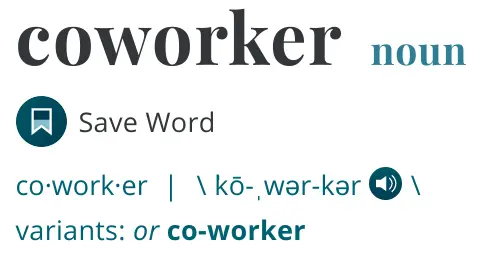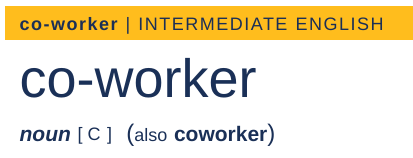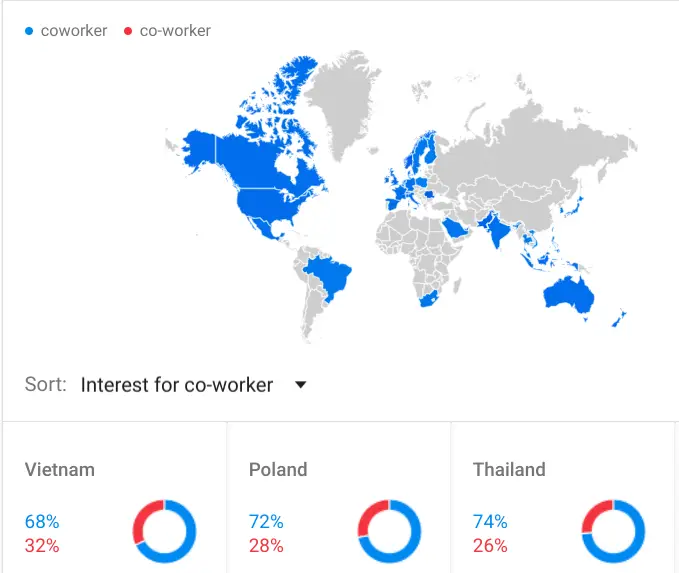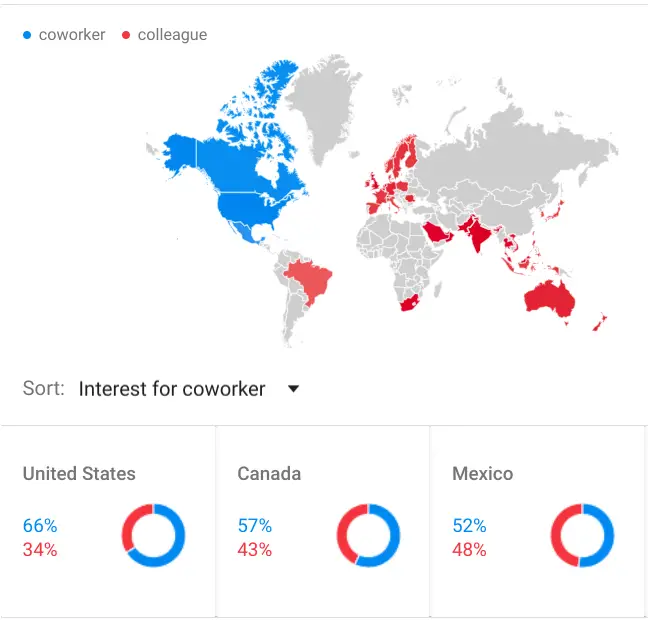This post contains affiliate links.
You are writing a work email and start second-guessing yourself – how should I address the group? Which word is appropriate and have I spelled it correctly? The good news is that you can’t go wrong in this situation because all are acceptable.
You are better off using coworker. Coworker is an accepted spelling by authoritative dictionaries, is more widely used, and also more efficient with fewer characters.

How to Spell Coworker vs Co-worker? Is There a Hyphen in Co worker?
The good news is you can’t go wrong! Both are acceptable spellings according to Merriam-Webster and the Cambridge English Dictionary. The Merriam-Webster dictionary lists coworker as the preferred spelling, with co-worker as a variant while the Cambridge-English dictionary has them the other way around with co-worker as the preferred variant. We researched more to see if there really was a preferred version based on locality.
Google Trends gives a clear picture. Since early 2005 the non-hyphenated spelling of coworker has consistently seen more widespread use while the co-worker variant is slowly declining. Even when compared by region, no geographic area prefers the co-worker spelling. Co-worker had the highest relative search volume in Vietnam (32%), Poland (28%), and Thailand (26%) and even then the top search phrase was ‘coworker or co-worker‘.
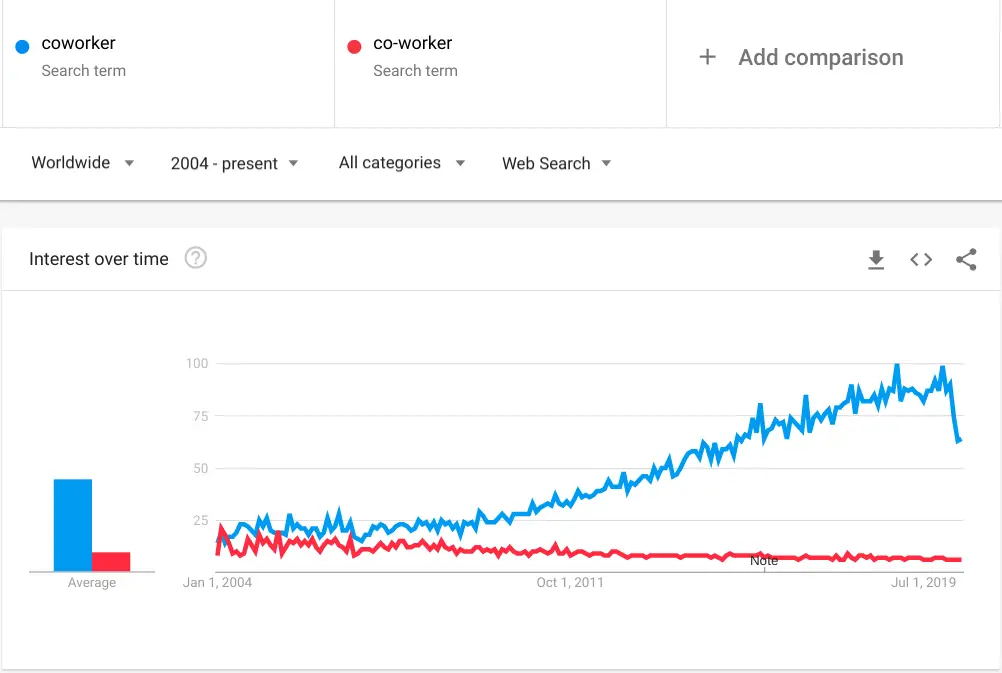
It is interesting to note the sharp spike down in 2020 as many people were working from home due to COVID-19. Presumably they were not bothered by their coworkers as much and the search volume reflects it.
Who is a Coworker?
a person with whom one works, typically someone in a similar role or at a similar level within an organization.
Google Dictionary
Coworker can also take on additional meaning when talking to members within the same company. Generally speaking, coworker is used to indicate people that work in close physical proximity as well – on the same floor in the same wing of the building or in the same department. Its a soft distinction that doesn’t always get applied but is common in everyday use.
For example, I work in Sales and I’m chatting with a someone from Operations during lunch. I would refer to the people I interact with regularly in Sales and Marketing as my coworkers. I see them every day and our job functions overlap rely on each other. However, when I’m having dinner and drinks with friends from outside of work, I would use the term coworker to reference everyone that works at the same company I do except for senior leaders that hold higher title (I wouldn’t normally refer to my boss as a coworker).
Is There a Difference Between Coworker and Co-worker?
There is no difference in meaning, both spellings are accepted by major reference dictionaries but the source of confusion likely results from the major style references preferring different variants. The Chicago Manual of Style Online does not hyphenate coworkers, but the AP Stylebook decided to keep the hyphen in co-workers to differentiate from “coworking spaces” for example where startups with no business relationships share office space.
While we understand the decision of the AP Stylebook to include the hyphen for clarity in newspaper articles, it goes against the longstanding trend in society that prefers coworker. For internal work communications, your meaning is clearly understood from the context of the message and the distribution list, we don’t see any reason to keep the hyphen.
Is There a Difference Between a Colleague and a Coworker?
Generally speaking, coworker and colleague mean the same thing – someone you work with at the same company or business. But depending on context, colleague can have an additional meaning someone in the same profession, usually with a similar rank or title. For example, a speaker at a professional conference may open their speech with a greeting of ‘distinguished colleagues‘ when addressing the audience. It would not be appropriate to substitute ‘distinguished coworkers’ unless the audience was comprised of staff from the same company as the speaker.

The other distinction is that most people will associate colleague with a more ceremonious and official tone. The connotation of coworker communicates a more casual and routine relationship. When making a formal announcement, colleague carries more weight and respect that is appropriate given the subject matter.
Synonyms for Colleague but not Coworker
Another way to think about the difference is that colleague can also mean counterpart or peer. When a diplomat meets with their counterparts (or peers with similar titles) from another country they are colleagues, but not coworkers. To be a coworker or fellow employee, both members must belong to the same organization that provides your paycheck.
Interestingly, colleague is more commonly searched worldwide than coworker and by a wide margin in all locations outside of North America.
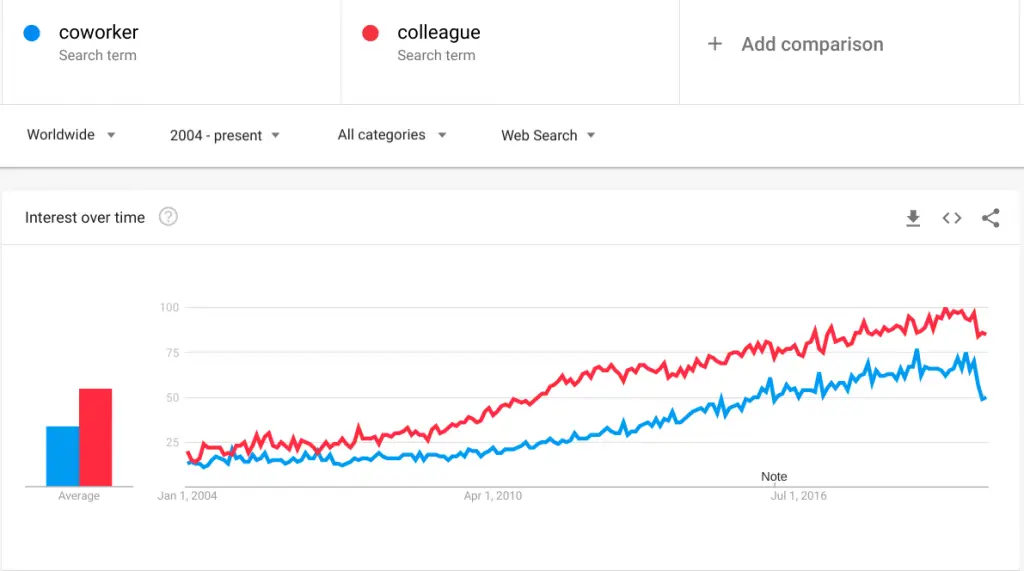
You can go down the rabbit hole with all the different colloquial uses of the terms because in some localities the meanings are reversed. You are better off asking a friend you trust that doing an internet search that can steer you in the wrong direction for your situation.
Coworkers in a Sentence
- I used a coworker as a reference for my job application – they worked in the same department and were familiar with my work at XYZ Company.
- After closing a major sale with a new customer, my coworkers and I went out to celebrate our hard work and excellent results.
- I think I caught this cold from one of my coworkers, they were coughing all day at the desk next to me.
- To be successful at my new job I need to develop strong relationships with my management team and my coworkers.

